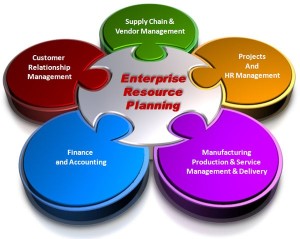Enterprise Resource Planning System
What is ERP?
The ERP deals with the planning and use of resources in the business. The resources are finance, material, human etc. to run business we need large amount of information but in big organization there are islands of information we can integrate these information using ERP software. ERP is acronym of Enterprise Resource Planing. ERP is also referred to as enterprise software ERP is all about making smart decisions. To make well informed and timely decisions you need instant access to accurate information from every function in your enterprise. ERP plays vital role to execute strategies, plans, decisions, and actions. The ERP provides a support in the transaction processing, updating, and actions in a time bound manner. ERP package encompasses all essential functionalities of business. ERP has a knowledge base for planning and decision making. All other system in organization is connected to the main ERP system. ERP is client-server type technology. We can use ERP systems on the UNIX and Windows NT. The main example is ERP systems. Organizations consider the ERP system their backbone and a vital organizational tool because it integrates varied organizational systems, and enables flawless transactions and production. However, an ERP system is radically different from traditional systems development. ERP modules are secure and reliable because authentication is a feature provided at all level before any task you have to provide necessary information like username and password. ERP is a software that encompasses all the key function of an enterprise. However it is necessary to define scope of the system because expectations of user are limitless.
Characteristics
ERP (Enterprise Resource Planning) systems typically include the following characteristics:
- An integrated system that operates in real time (or next to real-time), without relying on periodic updates
- A common database, which supports all applications
- A consistent look and feel throughout each module
- Installation of the system without elaborate application/data integration by the Information Technology (IT) department, provided the implementation is not done in small steps
Benefits OF ERP
- Recourses of company can be managed very efficiently with less cost
- Increases the productivity of organization
- ERM maintains the knowledge base which is very useful for strategic planning and decision making.
- ERP can lead to better outputs that benefit the company such as customer service, and manufacturing.
- It allows manager to set alarm, event, schedule and email.
- ERP also creates a more agile company that better adapts to change. ERP makes a company more flexible and less rigidly structured so organization components operate more cohesively, enhancing the business—internally and externally.
ERP Implementation
Requirement Definition and Description
Initially the research is carries out to collect requirements for ERP system requirements may be data, function, information, latest issues, studies, features. It is necessary to understand them to evaluate the ability of the ERP solution. Once the derivation RDD is made, it should be approved by the authorised person.
ERP software companies
There are many software companies offering world class ERP Software. Oracle is an IT company which is offering fusion ERP software for managing business. For more reading about technology news in singapore and seo to online marketing do view more about other pages.

